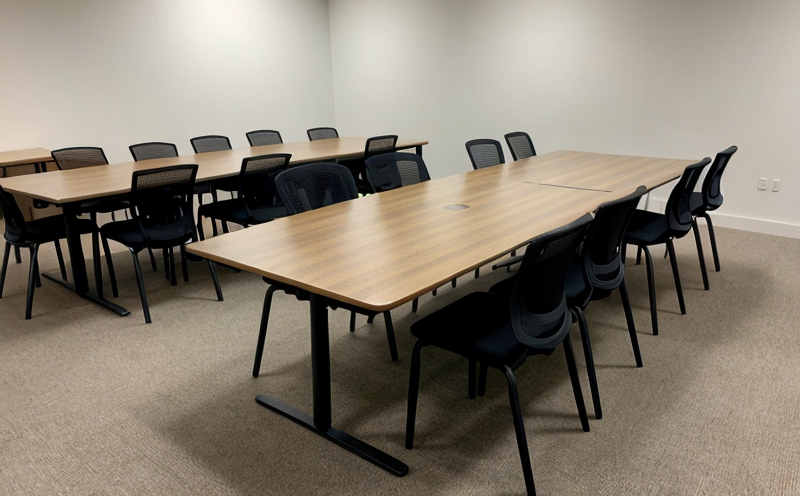BS EN 16094 Furniture Desks Measurement of Stability Under Loads Testing
The British Standard (BS) and European Norm (EN) standard BS EN 16094 outlines the requirements for testing furniture desks to ensure they meet stability under load criteria. This is crucial in sectors such as office furniture, home furnishings, and educational facilities where desk durability and safety are paramount. The standard covers various types of desks including but not limited to school desks, office workstations, and dining tables.
The testing process involves subjecting a desk sample to specific loads at defined points on the desk top in order to simulate real-world usage scenarios. This ensures that the product can withstand expected stresses without collapsing or causing injury to users. The tests are designed to mimic conditions that might be encountered during normal use, such as when a user is working or eating at the table.
The testing procedure typically involves placing standard weights on specific locations of the desk surface in accordance with the specified load requirements detailed in the standard. Once loaded, the stability and structural integrity of the desk are assessed to ensure it remains stable under these conditions. If the desk meets all criteria set forth by the standard, it is deemed compliant.
Compliance with BS EN 16094 is essential for manufacturers looking to enter European markets or those seeking to meet specific regulatory requirements. It demonstrates a commitment to quality and safety, which can enhance brand reputation and consumer trust. For R&D engineers, this service offers valuable insights into potential design improvements by identifying areas where current designs may fall short of the standard.
For quality managers and compliance officers, this test ensures that products being produced adhere strictly to international standards. By doing so, they help mitigate risks associated with non-compliance issues which could lead to costly recalls or legal disputes.
The testing process also plays a crucial role in procurement decisions by providing objective data that can be used when selecting suppliers and materials. This information helps ensure that only high-quality components are used in the manufacturing process.
Applied Standards
| Standard | Description |
|---|---|
| BS EN 16094:2020 | This European standard specifies the requirements for testing furniture desks to ensure they meet stability under load criteria. |
Scope and Methodology
The scope of this service includes providing comprehensive testing solutions that adhere strictly to BS EN 16094. Our team will work closely with clients from the beginning stages of project planning through execution, ensuring full compliance at every step.
Our methodology involves several key steps:
- Selection and preparation of desk specimens according to standard specifications
- Application of loads in accordance with prescribed procedures
- Data collection during testing process
- Analysis of test results against specified criteria
- Compilation and presentation of final reports detailing findings
The selection and preparation of desk specimens involve careful consideration to ensure they accurately represent the intended use case. Specimens are chosen based on factors such as size, material composition, and typical load-bearing capabilities.
Loading procedures follow precise protocols outlined in the standard. Loads are applied uniformly across designated areas of the desk surface until either failure occurs or specified limits are reached. Throughout this process, continuous monitoring ensures accurate recording of all relevant data points.
Data collection is an integral part of our testing approach as it provides crucial insights into how each specimen performs under various loading conditions. This information allows for detailed analysis and comparison against established standards.
Analysis involves reviewing collected data to determine whether the specimen meets specified stability requirements outlined in BS EN 16094. Any deviations from these criteria are noted and addressed accordingly.
The compilation of final reports serves as a summary document containing all necessary information regarding the testing process, results obtained, and conclusions drawn. These reports serve multiple purposes including internal documentation for future reference, external communication with stakeholders, and potential use in regulatory submissions.
Competitive Advantage and Market Impact
Compliance with BS EN 16094 brings significant advantages to manufacturers operating within the furniture industry. Meeting these stringent requirements enhances product safety and reliability, thereby increasing customer satisfaction and loyalty.
From a business perspective, achieving compliance opens up new market opportunities by allowing access to broader geographical regions where this standard is enforced. It also provides peace of mind knowing that products meet international quality benchmarks, reducing the risk of non-compliance penalties or recalls.
For R&D engineers involved in product development, adhering to such standards ensures that innovations are rigorously tested and validated before being introduced into production. This can lead to more robust designs capable of withstanding harsher environmental conditions while maintaining aesthetic appeal.





